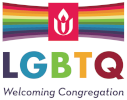Evensong, Preached at All Saint’s Episcopal Church, Peterborough
Rev. David Robins, Minister, Peterborough Unitarian Universalist Church
Trinity Sunday, May 18, 2008
Our Evensong service takes place on Trinity Sunday, the first Sunday following Pentecost. Pentecost comes to us from the Jewish tradition called the Festival of Weeks, or Shavuot. It celebrates the covenant of the Jewish people with God through their acceptance of the Ten Commandments brought to them by Moses. The Festival of Weeks is based upon a pre-Israelite Festival of the Harvest celebrated by the Canaanites.
In the book of Acts, chapter 2, verse one, the disciples, who were Jewish, had gathered to celebrate Shavuot. While gathered together, they were filled with the Holy Spirit and began to speak in tongues. They were accused of being intoxicated with wine. Peter, in a triumph of spin control, denies that they are intoxicated, and asserts that they are filled with the Holy Spirit because they have repented and been baptized as followers of Jesus. Peter was so convincing that 3000 people were baptized that day.
Adrian may have mentioned this morning that Thomas Becket was consecrated as the Archbishop of Canterbury on this Sunday, and his first act as Archbishop was to set aside this festival in honor of the Holy Trinity. As an ongoing example of how dangerous it can be to be a member of the clergy, Becket was killed by 4 of the King’s men.
On the day after Adrian invited me to preach at All Saints on Trinity Sunday, I began to notice threes all around the Unitarian church.
- Three front doors.
- Three windows on each side of the church.
- Three windows in the sanctuary behind the pulpit.
- Three doors into the nave.
- Three aisles in the sanctuary.
I don’t know if I am getting a message that the Unitarian Church is embedded with the Trinity, or if it is simply happenstance.
My religious forbearers, upon reading the Bible, decided that they were not Trinitarians, but Unitarians, because the Gospels did not mention the word ‘Trinity’, and because the doctrine of the Trinity is rather complicated and confusing. Even so, I have to admit that the doctrine of the Trinity is an intuitive and imaginative way to make sense of how God, Jesus, and the Holy Spirit are related. In the book of Matthew, chapter 28, verses 18 and 19, Jesus says “All power is given unto me in heaven and on earth. Go ye therefore, and teach all nations, baptizing them in the name of the Father, and of the Son, and of the Holy Ghost.”
Was Jesus talking about one divine entity expressed in three ways? Or, three different divine entities? Perhaps Augustine, the 5th century theologian gave us the best approach. He said, because we are made in God’s image, we can, at times of insight or spiritual awakening, detect the image of God, in the form of three. Augustine identified three properties in the soul; understanding, memory and will….or knowledge, self-knowledge and love. These are the trace particles of God left within us. The Trinity is an awkward formulation of what is best known in a mystical or transcendent manner.
The readings from Job in the Hebrew Testament and from the book of John offer us a glimpse of what the three aspects of the Trinity do in human life.
The Hebrew Testament reading that we heard earlier, is all about Job’s questions. As you know, Job suffered horribly from a bet that Satan made with God. There he is, lying in the hot sun, covered with boils and all manner of diseases. He has lost his wealth, his property, and most of his friends. Job spends hundreds of verses asking, “Why me? Does not God see my ways and number my steps?” God finally answers Job out of a whirlwind, “I will question you. Where were you when I created the universe? Who is this that hides counsel without knowledge?” God asks questions of us.
Job is humbled, and admits that he was full of false pride to assume that he knew how everything worked in life and in the universe. His self- inflation and self-absorption cut him off from God’s wonder and comfort. He asks for forgiveness, and is restored.
In the reading from John, we meet John the Baptist, who describes the Son of God as the one who takes away the sins of the world, in whom the Spirit remains, and who baptizes with the Holy Spirit. John the Baptist tells his listeners that the Son of God doesn’t build a kingdom on earth, nor intervene in politics. The Son of God requires that we give up pride, selfishness, and greed…the sins of the world that cut us off from God. Free of these encumbrances, the human soul is baptized, washed and filled with the Holy Spirit. The soul becomes a reservoir filled with love and enthusiasm to meet the day.
These are experiences that are universal, whether one is a Trinitarian, or a Non-Trinitarian, religious or secular. It is embedded in the human psyche. The Trinity describes a three-part process of overcoming the obstacles in us in order to be united with our highest powers, and then sharing these powers with the world.
Unitarians and their forbearers have been fussing over the Trinity for almost 2000 years. Who is God? Who was Jesus? Who is the Holy Spirit? In this way we are the religious heirs to Bishop Arius, now known as a heretic. While it is doubtful that UU’s would count many Arians among us today, we are heirs to some of the most intriguing questions about Jesus and God. These are questions that have not been asked for 1700 years. Was Jesus 100% God, and 100% human? What happened to God when Jesus was born? What happened to Jesus when God died on the cross? Is the Holy Spirit only an instrument of God, or can we humans invite it into our lives? Are some people more imbued with the Holy Spirit than others? Were the American Transcendentalists, mostly UU’s, those gifted with the Spirit, who challenged the status quo of what Emerson called “the cold Unitarianism of his day?”
Karen Armstrong, an author whom I greatly admire, has said of the Trinity, that it was talked about in the first 300 years with great enthusiasm and debate. An enthusiasm similar to the rivalry between the Boston Red Sox and New York Yankees fans today. Every baseball fan knows that a bullpen has to have three main starters. And every batting line-up depends upon the first three batters to get on base. Threes abound in baseball.
Armstrong goes on to say that “the doctrine of the Trinity has often been misunderstood in the Western world. People tend to imagine three divine figures or else ignore the doctrine altogether and identify ‘God’ with the Father and make Jesus a divine friend. Though Jews and Muslims find the doctrine puzzling, even blasphemous, both Jewish and Muslim mystics developed remarkably similar conceptions of the divine.” In one sense, the Trinity is a brilliant solution to the human tendency to idolatry. A God who is wholly ‘out there’, or a God taking on the form of a human, or miracle like events that are wholly out of our hands….each one can easily come to be our idol. Yet, the Trinity makes the audacious claim that the transcendent asks me to not give my heart and mind completely to one part of the Trinity experience, but to live my life, drawing deeply and profoundly from the ways in which transforming grace comes to me and guides me, and corrects me. One of the best ways to guard against idolatries of the mind and spirit is to ask questions.
UU’s like to think of themselves as ‘people of the question.’ Sometimes we ask questions gracefully, curiously, respectfully. Other times we are more contrarian in our questions. Asking questions in religion in general and in Christianity in particular is not an unheard of practice. After all, Jesus asked over 400 questions in the 4 Gospels. Many of them were rhetorical questions, but he asked the questions to not just set up his answers, but also to make people think, and wonder, and break free of the spiritual binding of pride, selfishness, and greed. He asked questions in order that people might find a path to salvation and to transformation, and to guard against idolatries of the mind and spirit. Jesus seemed to be leading people to understand that revelation is not sealed.
I’ll close by showing you a painting of the Trinity that hangs in my office. It was a gift from an ardent humanist in my previous congregation. He is also a lover of art, history science and travel, with a good sense of humor. He typed a short note and taped it to the back of the painting when he gave it to me. He wrote, “Dear David, Enclosed, please find a genuine Ukranian icon which I received as change at the St. Sophia Cathedral in Kiev. I bought a St. Nicholas icon for my granddaughter for $3 and paid for it with a $5 bill. It is not customary to make change to US tourists in Ukraine, so I was handed the small icon of the Holy Trinity. I determined then and there that this would be an appropriate gift to a Unitarian minister”.
Thank you.


